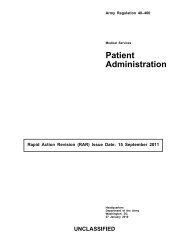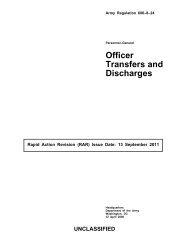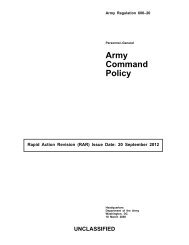Care and Disposition of Remains - Army Publishing Directorate ...
Care and Disposition of Remains - Army Publishing Directorate ...
Care and Disposition of Remains - Army Publishing Directorate ...
Create successful ePaper yourself
Turn your PDF publications into a flip-book with our unique Google optimized e-Paper software.
14–4. Reimbursement <strong>of</strong> memorial service expenses<br />
a. The PADD <strong>of</strong> those declared dead <strong>and</strong> determined to be nonrecoverable after 1 January 1961 may be reimbursed<br />
for expenses incurred in conducting a memorial service. Reimbursement allowance will not exceed the amount actually<br />
expended; under no circumstances will payment exceed the maximum interment allowance in paragraph 13–9. A claim<br />
for reimbursement will be allowed only if presented within 2 years after the PADD is <strong>of</strong>ficially notified that the person<br />
is dead.<br />
b. The PADD will submit his or her claim for processing <strong>and</strong> payment. The claim will be submitted on a DD Form<br />
1375 with the memorial service contract <strong>and</strong> GPL <strong>and</strong> any other receipts for expenditures attached.<br />
Chapter 15<br />
Interment flag<br />
15–1. Persons authorized an interment flag<br />
Interment flags <strong>and</strong> flag cases are provided by the <strong>Army</strong> for Regular <strong>Army</strong> soldiers, retirees <strong>and</strong> veterans who are<br />
continuously hospitalized as an inpatient from the date <strong>of</strong> retirement or discharged until the date <strong>of</strong> death (retired <strong>and</strong><br />
retained or discharged <strong>and</strong> retained), veterans who are Medal <strong>of</strong> Honor recipients, cadets assigned to the United States<br />
Military Academy at West Point, cadets <strong>of</strong> the Reserve Officer Training Corps (ROTC) who are entitled to mortuary<br />
benefits, Reserve <strong>and</strong> National Guard soldiers who are entitled to mortuary benefits, applicants for enlistment, <strong>and</strong><br />
Department <strong>of</strong> the <strong>Army</strong> civilian employees who die during contingency operations (see chap 2 for details when<br />
mortuary benefits are authorized). Hardwood flag cases are not authorized for presentation at interments <strong>and</strong> memorial<br />
services for active duty soldiers held prior to 1 October 1993 or civilian employees who die while deployed in support<br />
<strong>of</strong> a military contingency operation prior to 1 October 1994.<br />
15–2. Interment flag for deceased Reservists not authorized mortuary benefits<br />
a. Interment flag with case. An interment flag with case is authorized at Government expense per 10 USC 1482f for<br />
issuance to the PADD <strong>of</strong> a soldier <strong>of</strong> the Reserve components who dies under honorable conditions <strong>and</strong> who is not<br />
covered under table 2–1 if, at the time <strong>of</strong> that soldier’s death, he or she—<br />
(1) Was a soldier <strong>of</strong> the Ready Reserve (<strong>of</strong> either the <strong>Army</strong> National Guard (ARNG) or USAR) or<br />
(2) Had performed at least 20 years <strong>of</strong> service computed under section 1332, title 10, United States Code, <strong>and</strong> was<br />
not yet entitled to receive retired pay under section 1331, title 10, United States Code.<br />
b. Determining eligibility <strong>of</strong> Reservists.<br />
(1) ARNG. The installation comm<strong>and</strong>er at the place <strong>of</strong> death or the State adjutant general will determine eligibility<br />
<strong>of</strong> deceased soldiers <strong>of</strong> the ARNG under criteria in a above.<br />
(2) USAR. The installation comm<strong>and</strong>er at the place <strong>of</strong> death, the Comm<strong>and</strong>ing General, Forces Comm<strong>and</strong> or the<br />
Comm<strong>and</strong>ing General, U.S. <strong>Army</strong> Reserve Personnel Comm<strong>and</strong> (AR–PERCEN), as appropriate, will determine eligibility<br />
<strong>of</strong> deceased soldiers <strong>of</strong> the USAR under criteria in a above.<br />
c. Flag expenses. Expenses for presentation or issuance <strong>of</strong> the flag for eligible deceased soldiers other than those<br />
cited in table 2–1 will be paid from the appropriations <strong>of</strong> the ARNG or USAR.<br />
d. Stocking <strong>and</strong> requisitioning flags. Stocking <strong>and</strong> requisitioning flags.<br />
(1) ARNG. The USPFO will maintain a minimum stock <strong>of</strong> flags to be issued as required.<br />
(2) USAR. Flags for USAR deceased will be requisitioned on manually prepared, unfunded requisitions; they will be<br />
mailed to the Defense Personnel Support Center, 2800 South 20th Street, Philadelphia, PA 19101.<br />
e. Responsibility for issuing flag. The flag will be issued or mailed by the comm<strong>and</strong>er designated in b above on<br />
request <strong>of</strong> the PADD.<br />
15–3. Eligible interment flag <strong>and</strong> flag case recipients<br />
a. Eligible interment flag <strong>and</strong> flag case recipients are established by 10 USC 1482. The statute authorizes an<br />
interment flag <strong>and</strong> flag case to be presented to the PADD <strong>and</strong> the decedent’s parents when they are not the PADD. The<br />
statute defines parents as a natural parent, a stepparent, a parent by adoption or a person who stood for a period <strong>of</strong> not<br />
less than one year before the death <strong>of</strong> the decedent in loco parentis. The statute further gives precedence to receive a<br />
flag to the persons who exercised a parental relationship at the time <strong>of</strong>, or most nearly before, the time <strong>of</strong> death.<br />
b. If the decedent’s parents are married, they are authorized only one interment flag <strong>and</strong> flag case. If the decedent’s<br />
parents are legally separated or divorced, each parent is authorized an interment flag <strong>and</strong> flag case.<br />
c. Other relatives <strong>of</strong> the soldier, to include the soldier’s brothers <strong>and</strong> sisters, children, <strong>and</strong> former spouses <strong>and</strong><br />
friends are not authorized an interment flag or flag case unless determined to be the PADD. As recipients are<br />
established by Federal statute, exceptions to present flags <strong>and</strong> flag case to other persons cannot be approved.<br />
AR 638–2 • 22 December 2000<br />
63
















